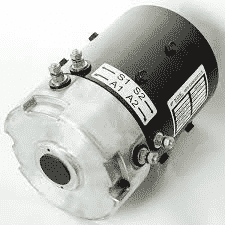In this post, we will discuss how to change the direction of rotation of the DC Series Motor. The rotational force of the DC motor is called the torque.
The torque experienced by the armature conductor is given by;

From the above expression, it is clear that the torque of the DC motor depends on the two factors.
- Magnetic flux
- Armature current
| Read More: What is magnetic flux? |
Direction reversal of separately excited DC Motor:
From Equation(1), it is clear that the direction of the torque and the speed can be reversed by changing the direction of either the field current or armature current by changing the polarity of the DC voltage. However, this method is used for separately excited DC motors where it is possible to change the polarity of the field voltage or armature voltage. This method can not be used in the case of a DC series motor.

Now, let us understand how the direction of the DC series motor can be changed.
Direction reversal of DC Series Motor:

In the DC series motor, the field and armature winding are connected in the series connection. Therefore, the armature current and field current are always equal. If the polarity of the applied armature voltage is changed, the direction of the field current and the armature current both get changed. Therefore, the direction of the torque and speed will remain unaltered.
Thus, in the case of the DC series motor, the speed can not be changed by changing the polarity of the armature voltage. The direction of rotation of the DC series motor can be changed only if the direction of either field current or armature current is changed.
The direction of rotation of the DC series motor may be reversed by changing;
- The polarity of either field
- or the polarity of the armature winding.
The speed of rotation of the DC series motor can be changed by connecting the field winding and armature winding, as depicted in the given picture.
